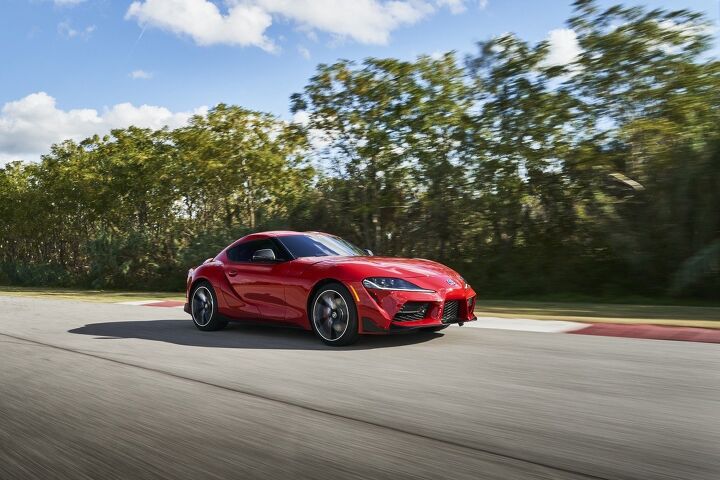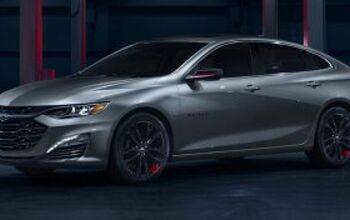Unlike Toyota's Unrealistic Lexus LC Sales Expectations, Toyota Supra Sales Goals Are Downright Sensible
“You only produce one car less than the demand for the vehicle,” the late Sergio Marchionne said of Ferrari’s founding marketplace strategy. Of course, that translates to thousands more cars per year than it did in decades past. But Ferrari remains largely committed to that principle.
Now, in Ferrari-like language, Toyota says, “We’re operating on the basis that it’s better to have one too few than far too many,” when it comes to the new Supra.
Toyota spokesperson Nancy Hubbell revealed to TTAC early sales goals for the fifth-generation Supra that are distinctly tempered compared with the lofty expectations Toyota divulged the last time it launched a high-end coupe.
Followers of premium two-doors will recall that Toyota initially hoped to sell 400 copies of the Lexus LC per month in the United States. 4,800 sales per month for the $90K+ Lexus would have put it well ahead of virtually every competitor aside from the all-conquering Porsche 911.
But in its first full calendar year on the market, Toyota reported only 165 Lexus LC sales per month in the U.S., 59 percent short of the company’s goal. Instead of outselling competitors, the LC was easily outsold by vehicles such as the BMW 6 Series, Jaguar F-Type, and Mercedes-Benz SL. The Porsche 911 sold five times as often.
In the LC’s case, Lexus was falling back on a handful of reasons. The company believed that the brand’s strength in the U.S. – where basically half of all Lexus vehicles are sold – would drive LC demand. Lexus also believed that the LC’s affiliation with the LF-LC concept forerunner would pay dividends. And consumer clinics suggested the LC wouldn’t just steal sales from the 6 Series, SL, and F-Type, but also Aston Martin and Maserati.
Whether Toyota learned its lesson after the LC failed to win hearts and minds, or whether the more focused nature of the Supra as a sports car inherently alters the demand picture, Toyota’s stated sales expectations for the $49,990 Supra are clearly more modest.
“We’re focused on the first 1,500 Launch Editions for this year,” Hubbell says, “and will adjust supply based on demand.” (The Launch Edition is priced from $55,250.)
1,500 sales in the second half of 2019 would translate to around 250 Supras per month.
Granted, it’s fair to conclude Toyota’s stated expectation represents a healthy dose of false modesty. After all, the Launch Edition is only one of three Supra models – there are 3.0 and 3.0 Premium versions, as well. Such models wouldn’t exist for the first model year if Toyota had no intention of selling any.
But it’s also fair to conclude that, this time, Toyota’s analysis of the sports car market provides no room for overconfidence. In 2018, declining year-over-year U.S. sales were reported by the Alfa Romeo 4C, Audi TT, BMW 2 Series and 4 Series; Chevrolet Camaro and Corvette; Fiat 124 Spider; Ford Mustang; Jaguar F-Type, Lexus RC; Mazda MX-5 Miata; Mercedes-Benz AMG GT, SL-Class and SLC-Class; Nissan GT-R and 370Z; Subaru BRZ, and Toyota 86.
You get the picture. These aren’t friendly times for sporting vehicles.
The Toyota Supra is finally returning, but it returns only to fight its rivals over a small slice of a shrinking pie.
[Images: Toyota]
Timothy Cain is a contributing analyst at The Truth About Cars and Driving.ca and the founder and former editor of GoodCarBadCar.net. Follow on Twitter @timcaincars and Instagram.
More by Timothy Cain
Latest Car Reviews
Read moreLatest Product Reviews
Read moreRecent Comments
- ToolGuy There was a time when in a place called America there were roads, and they were paved, and they were paved smoothly enough for a vehicle like this. Perhaps our next President will bring back that concept.
- ToolGuy I suppose I will listen before commenting. (TG, what a fair-minded dude!)
- ToolGuy "The technology is much more advanced to be better than a role model driver,”• Do any of you know what a "role model driver" is? No, I guess you wouldn't. 😉
- ToolGuy I might be Batman.
- Lou_BC Well, I'd be impressed if this was in a ZR2. LOL




































Comments
Join the conversation
I've seen the LC in the flesh... it's a shame it doesn't sell because it is achingly gorgeous and brimming with presence. It's a car we claim to want but really don't deserve.
I'm guessing, or at least hoping, this is just marketing speak. Nothing is more destructive of quality, and value for money paid by the customer, than artificially constraining supply of a product. Selling "exclusivity" may be an easy way to skim some easy money off toffs and fanbois. Fine if you are a basketball club selling hats, or a race team selling road cars. But it's a poor reflection on a company with a reputation for engineering excellence, efficient production processes, and giving the customer more than he paid for, the likes of Toyota.